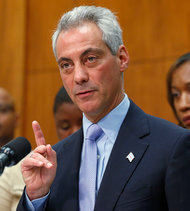Mayor Rahm Emanuel said Thursday he’s back at the bargaining table with organized labor in hopes of squeezing through the window the Illinois Supreme Court cracked open, even as it overturned his plan to save two of four city employee pension funds.
Two weeks ago, the Illinois Supreme Court overturned Emanuel’s plan to raise employee contributions by 29 percent and end compounded cost-of-living adjustments. Those measures were intended to save the two pension funds that are due to run out of money: Municipal Employees, broke in eight years, and Laborers, in 12.
But the ruling also stated, “The pension protection clause was not intended to prohibit the Legislature from providing ‘additional benefits’ and requiring additional employee contributions or other consideration in exchange.”
On Thursday, Emanuel said he hopes to seize on the “opening” the Supreme Court created to forge an agreement with union leaders that can pass legal muster.
“There’s an opening. . . . There’s something to the ‘consideration’ [argument]. But there’s other opportunities to work together and I’m going to stay at that table to try and figure this out. That’s my commitment,” he said.
“I am trying to fix and clean up the mess I inherited. But don’t confuse cleaning up the mess with the mess that was created. I want to be very clear about that. . . . The seeds of the crisis we have today were planted decades ago when decisions were made and benefits were given away without regard to how to pay for ’em.”
Plaintiffs’ attorney Clint Krislov said he has reached out to the Emanuel administration to re-start negotiations, but hasn’t heard back from City Hall.
“I don’t think it’s difficult to craft an agreement. But you have to have the discipline to say that people who are participants today have their entitlements protected and people who begin working tomorrow have a different package of benefits,” Krislov said.
“To craft an agreement that changes the rights of current participants, they need to put together a package that each individual participant can choose to take or not. They have to make it attractive. There are ways to do that. … There have been multiple settlements in the health care field. I believe we could reach a permanent resolution to everything that most people would probably readily choose.”
Illinois Senate President John Cullerton (D-Chicago) has applied that same “consideration model” to the state’s pension crisis. He has called the Supreme Court ruling “more than a glimmer of hope” for Chicago.
“We have a clear path on how to solve it. This is a positive decision. The court is basically saying if you do that in a collective bargaining setting, that’s a contract and you can ratify it,” Cullerton, Emanuel’s closest ally in Springfield, told the Chicago Sun-Times on the day the ruling came down.
“They could go in and renegotiate the same bill we passed, ratify it in a collective bargaining setting and it would be fine. Reduce certain pension benefits. Increase contributions. They could go back to the table and negotiate the same thing and that contract would be constitutional where the bill was not.”
In the short run, the Supreme Court ruling will ease the burden on beleaguered Chicago taxpayers.
The city’s annual contribution to the two funds will drop by $90 million this year and Emanuel will be off the hook to find $250 million in additional revenue over five years.
But over time, the city could be forced to bear a far heavier burden unless they can find a way to convince new employees to meet the city halfway.
Emanuel initially proposed raising property taxes by $250 million over five years to bankroll the city’s increased contribution to save the two funds. He substituted a 56 percent increase in Chicago’s telephone tax for the city’s first-year contribution, only after then-Gov. Pat Quinn balked at a pre-election property tax increase.
If the new round of collective bargaining fails to produce pension reforms that can pass legal muster — or if those savings run short of the overturned plan — the mayor is expected to try to negotiate work-rule changes, lower break-in pay for new employees, another round of health care reforms, and other cost-saving concessions and dedicate those savings to pensions, City Hall sources said.
The remaining shortfall could come from raising the telephone tax. Chicago is legally authorized to raise its telephone tax to the highest rate charged by any municipality in the state. That means there’s room to grow.
More property tax increases are unlikely, considering that Emanuel just raised property taxes by $588 million for police and fire pensions and school construction and has promised to raise them by another $170 million for teacher pensions, whether or not the state does its part to help the nearly bankrupt Chicago Public Schools.


